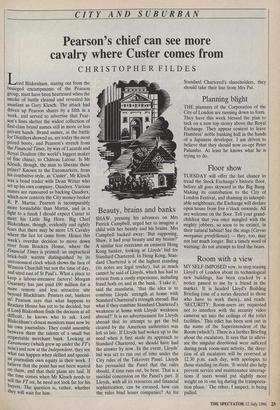CITY AND SUBURBAN
Pearson's chief can see more cavalry where Custer comes from
CHRISTOPHER FILD ES
Lord Blakenham, staring out from the besieged encampments of the Pearson group, must have been heartened when the smoke of battle cleared and revealed his assailant as Gary Klesch. The attack had driven up Pearson shares by a fifth in a week, and served to advertise that Pear- son's lines shelter the widest collection of first-class brand names still in more or less private hands. Brand names, as the battle for Distillers showed us, are today the most prized booty, and Pearson's stretch from the Financial Times, by way of Lazards and Royal Doulton (the world's biggest maker of fine china), to Château Latour. Is Mr Klesch, though, the man to liberate these prizes? Known to the Euromarkets, from his combative style, as 'Custer', Mr Klesch was a bond trader with Dean Witter who set up his own company, Quadrex. Various names are rumoured as backing Quadrex, which now controls the City money-broker R. P. Martin. Pearson is incomparably more formidable than Martin, and in a fight to a finish I should expect Custer to meet his Little Big Horn. Big Chief Blakenham, though, evidently and rightly fears that there may be more US Cavalry where the last lot came from. Hence this week's overdue decision to move down river from Bracken House, where the Financial Times is printed: an impractical brick-built warren distinguished by its astronomical clock which shows the face of Winston Churchill but not the time of day, and sited east of St Paul's. What a place to keep a labour-intensive factory! Morgan Guaranty has just paid £90 million for a more remote and less attractive site beyond Blackfriars. Printers out, bankers in! Pearson says that what happens to Bracken House has yet to be decided, but if Lord Blakenham finds the decision at all difficult, he knows who to ask. Lord Blakenham's closest monitors must now be his own journalists. They could assemble between them the talents of a small but respectable merchant bank. Looking at Eurornoney (which grew up under the FT's nose) and now at the Independent, they see 'what can happen when skilled and special- ist Journalists own equity in their work. I believe that the point has not been wasted on them, and that their plans are laid. If the time comes when Mr Klesch needs to sell the FT on, he need not look far for his buyers. The question is, rather, whether they will wait for him.


















































 Previous page
Previous page